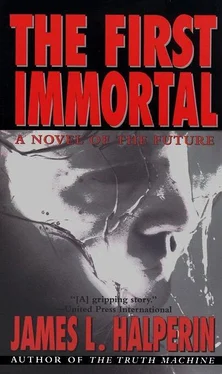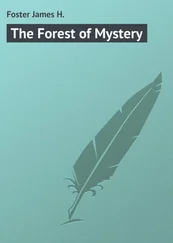“Yeah, things must’ve been real different back then. Secrecy’s the last thing you’d want in today’s world. Openness keeps us secure. Thank God for that,” I added; Epstein probably hoped it was just an idiom. “And for you, too. My great-grandfather’s truly blessed to have a friend like you.”
“Actually, all I’m doing is repaying a few years from the decades—or centuries—he rescued for me. The least I can do.”
“Still—”
“Y’know,” Epstein interrupted me before I could embarrass him further, “Ben often mentioned Toby Fiske to me. When he wakes up, I intend to explain what the man did for him, giving him morphine like that, subjecting himself to civil and possible criminal charges. Very soon your great-grandfather’ll realize just how great a friend Dr. Fiske was. I only hope he can remember him.”
“I hope so, too.”
I’d offered to revive my great-grandfather at no charge, but Epstein had insisted on paying the going rate. For today’s process, I would bill him 2,600 WCUs (world currency units), barely an average worker’s monthly earnings. The true cost, however, extended far beyond money. Sponsoring any long-term reviv entailed great personal responsibility and a major commitment of time; usually two to five years, even for early twenty-first century suspensions. Epstein had agreed to sponsor the reanimation, but had already decided not to cover members of Ben’s family, or Toby Fiske. That would become the burden of Ben himself.
The Code of Reanimation to which Epstein—and most others during the 2070s—subscribed, was that one took care of one’s own family, and perhaps one’s friends, but never their families and friends. The restoration of a loved one brought joy to both restorer and restoree, while the restoration of a loved one’s loved one was often a recipe for sorrow or resentment. The philosophy behind the Code was based on the axiom that benevolence should bring its provider the greatest possible pleasure, and thus altruism worked best when bestowed upon the deserving. Furthermore, the Code was a form of motivation to those who were reanimated; it encouraged them to become productive more quickly so they could sponsor revivs of their own suspended loved ones.
An adult human body contains nearly a septillion (10 24) protein “machines,” and each cell contains thousands of different kinds of molecules. Still, within fifty-eight minutes the army of 24 trillion nanomachines and nano-AIs had mapped the location of every molecule that comprised Benjamin Smith. Less than 141 minutes later, each broken or lost piece of protein had been repaired or replaced, and every molecule restored to its ideal position.
A small boy attempts to heave a softball to his smiling father, barely five feet away. “Nice try, buddy boy. Let’s give it another go.” All at once the boy is years older, watching a documentary film at school. A hummingbird’s wings beat on the screen. “Seventy-five times per second,” the announcer says, “yet it still moves more slowly than your arm throwing a baseball. That’s because the wings are so tiny.” Now much older, making love in a hotel room with Marge Callahan. Then without warning, the horror-filled bowels of the Asahi Maru; the screams, the smells, the terrible confinement and fear. He stares down at hands scoping a lower intestine. Skilled hands. His own. He knows he is valuable, useful, and wishes he could always feel this way. His heart pounds as he drives to the hospital to see his father. “I don’t have time for your questions right now,” a terrified and angry voice shouts at his only son. Damn! Why did I say that? Floating above himself, he watches Toby Fiske inject morphine into the IV next to his own unconscious body, then the tunnel, and the light…
* * *
It seemed to Ben as though he’d been dead for a period of hours. When he first emerged from the tunnel, he’d found himself welcomed to a heavenly place by his father and Marge. But events had progressed from the mysterious to the bizarre. His age had advanced and reversed almost at random; one moment he was an old man, the next a child. He’d met, chased, run from, conversed with, and even become dozens of people he’d known, or known of. He’d traveled to places he’d seen or imagined, always finding them strange yet never surprising. His thought processes had become more unpredictable and fractal than at any conscious moment of his life.
Eventually he came to realize that he’d simply been dreaming during his revival: the lucid, three-dimensional dreams of the oxygen deprived-then-reventilated. It was as if his mind was directing its own reconstruction, putting itself back together again, shard by shard, fragment by fragment.
But when did he dream? And for how long?
He opened his eyes. The room appeared clean, streamlined, sparkling white; radical in its modernism, yet benignly unintimidating. It smelled wonderful, comforting. Brahms played in the background. His body felt rested, healthy, and strong. Yet he strained and shivered with anxiety and dread. Where the hell was he?
He saw Carl Epstein’s very young face. “Welcome back, Ben.”
“Welcome back?” Ben heard a voice answer, and, yes, it was his own, but distant, strangely separated. By time? “Where am I?”
“You’re back in Boston,” Epstein answered.
“B-But how?”
“Nanotechnology.”
“What’s that?” Good God, I’m back? Back! It’s real!
Epstein placed his arm around my shoulder, guided me closer to my great-grandfather, and introduced us: “Ben, this is Trip Crane, your great-grandson. I think he can explain it better than I could ever hope to.”
I began: “Nanotechnology is the science of manufacture and repair at the molecular level—”
As I watched Ben’s eyes studying my face, I felt I could actually see the wonder growing in them. “My great-grandson?” he interrupted.
Instinctively, without any thought, I grasped his right hand in both of mine. “Yep. I’m a nanoscientist, Ben. We used trillions of tiny machines to put all your molecules back in the right place. To repair all damage to your body and mind from freezing, age, and disease.”
“Age, too?” he asked. “You mean I’m young again?”
“Yep. In fact, that part was a lot easier than repairing the freezing damage. We simply restored all your DNA along with every gland, organ, and neuron.”
Ben’s eyes widened. “How did you know where everything goes?”
“Artificial intelligence. Much like very advanced computers.”
“Incredible.”
“Not when you think about,” I said. “In a lot of ways, nanotechnology is actually easier than industrial manufacture was back when you were suspended.”
“Easier?”
Ben was looking at me as if he’d suddenly found himself in an alien world. In a way, he was right. Perhaps, I thought, just telling him the simple science might calm him best. “With nanotechnology, all you need is a good description of something, and you can make another one. And if you don’t have a good description, nanomachines can examine the object and describe it for you. During the twentieth century, engineers had detailed blueprints of automobiles, yet to turn those blueprints into working cars took a lot of highly skilled people. With nanotech, none of that’s necessary.”
Ben tilted his head and bunched his mouth into a scowl. “Why not?”
I figured what happened next was his fault, not mine. After all, he’d asked, hadn’t he? “I can think of six reasons,” I said. “First: The parts a car factory needed were expensive, but the parts nanotech uses—atoms—are incredibly cheap.
“Second: Car manufacturers used thousands or even millions of different types of parts, and had to learn how to operate them all. At most, nanotech can only use ninety-six different parts—the number of stable elements known so far—and for all practical purposes, everything we need is made from less than sixty different elements. And living organisms comprise less than thirty-five.
Читать дальше












